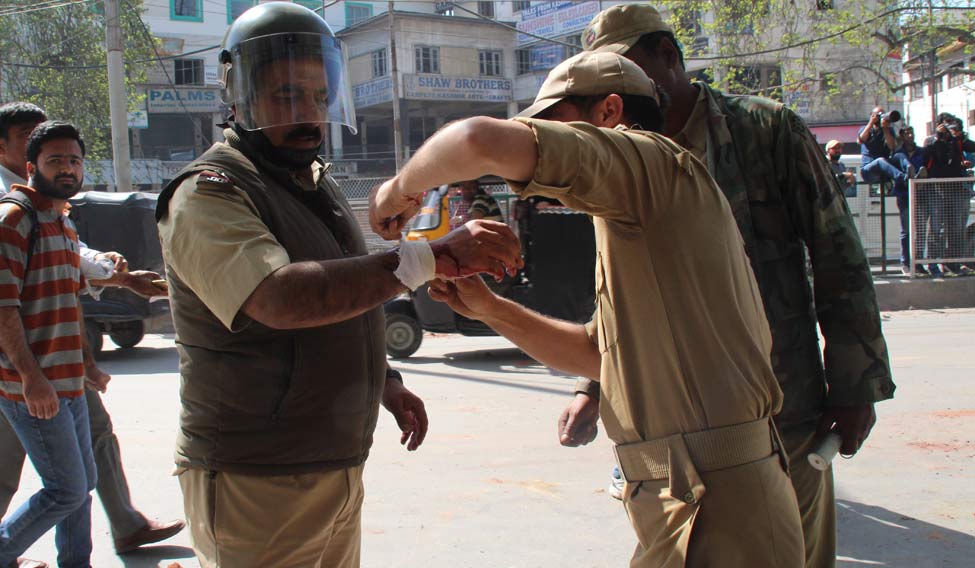Thirty-year-old-constable Abid Hamid (not his real name) was repeatedly kneading his left cheek. Every time he felt it, it hurt.
Hamid was hit by a stone during Monday's clashes between the police and college students at Srinagar's posh M.A. Road.
The protest broke out in retaliation to a police assault on students of a degree college in Pulwama on April 14, in which at least 50 students had sustained injuries. Apparently, the clashes took place in the presence of a nakka party close to the campus.
A day later, students across Kashmir took to the streets to protest the high-handedness of the security forces against Pulwama college students. Intense clashes took place between the students, including females, and the police in Srinagar, Sopore, Tral, Pulwama and Baramulla.
In an attempt to restore calm, the police fired scores of tear smoke shells and cane-charged the enraged students.
Hamid and his colleagues were deployed at M.A. Road to quell the agitation. The fracas continued for several hours forcing shops to close down and diversion of traffic through city's main arteries.
The students hit the police using intense barrage of stones and brickbats. Hamid was hit in the face and left leg above the ankle.
The situation eased by afternoon, but not for Hamid. He seems to be in great distress as he was alternately rasping his cheek and leg.
His swollen cheek had turned red with a bluish tinge. “Should you consult a doctor?” I ask.
“No, this is routine,” he says. “We are used to this.”
“Don't you wear the helmet and the leg guard?”
“We do, but it hardly matters when you face a barrage of stones,” he says.
He then points to his colleague who was sitting inside a jeep.
“His entire upper jaw was crushed by a stone," Hamid explains. “The SP got it replaced with an artificial one.”
Soon, two more of his colleagues open up.
“We can handle this, but the advisory the DGP has issued that policemen from south Kashmir should avoid visiting their homes is more distressing than the stones we face,” says Ali Khan (not his real name).
“What was the need for that?” he cannot stop from asking. “We used to visit homes and return and nobody said anything.”
But have the houses of several policemen been ransacked by militants in south Kashmir?
“Not in my area,” Khan says. “The situation is more dangerous in Kulgam, Shopian, Pulwama and Tral.”
Another cop joins the conversation. “They could have quietly conveyed this to us through our seniors,” he feels. “Now, it will raise unnecessary suspicion when we would go home.”
This was, however, not the first time that police kept themselves from visiting their families during political tensions. During the 2016 uprising, another constable says he hardly visited his home in south Kashmir. A few who did, took to mufti and tucked their cards in their shoes. Some even procured fake ID-cards.
Quite close by, Station House Officer Rashid Khan and a few of his men were standing—guarding opposite the SP college. A cop was wrapping bandage around his injured wrist. Wearing a helmet, Khan showed no signs of unease as blood dripped down his fingers.
The situation eased by around 6 pm. The tell-tale signs of what unfolded during the day were visible on M.A. Road.
The stretch between the Women's College to Poloview was littered was brickbats, pieces of rocks and stones. The air still smelt of tear gas. At some places, pieces of brickbats crushed by speeding vehicles traced a trail.
How come the students had so many stones?
“They probably carried them in their backpacks,” Khan replies. Despite the injury, he seemed content that the police didn't fire bullets.
“We showed a lot of restraint,” he explains.
Later the day, there was news of a young girl Iqra, 17, who suffered a skull injury allegedly from a rock that the CRPF hurled at some protesting female students at Sekidafar in downtown Srinagar.
However, the police refuted the charges and blamed the stone-pelters for the incident.
By dusk, Hamid and his colleagues seemed worn out, not because of the clashes but by the advisory from the DGP.
But regardless of the advisory, many young policemen from south Kashmir said they would visit their homes.
DGP S.P. Vaid was furious when THE WEEK asked him by when would the advisory be withdrawn. “Who says that? Don't make an issue out of this advisory,” he thundered. “Can't a father ask his family members to take care?” he questioned.
“We have families and how can we not go and meet them?” asks another cop. But a top CID officer told THE WEEK that most often the cops used to visit the homes without informing their seniors.
“Now they will have to inform their seniors who will alert the police station and army unit concerned whenever the cops visit home, as a precautionary measure,” the office said.





